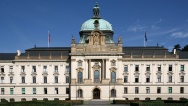Press Advisories
28. 6. 2021 15:14
Government approves aid to people and municipalities in South Moravia affected by a natural disaster
Entrepreneurs affected by the tornado will be able to use a subsidy programme from the Ministry of Industry and Trade. They will be able to receive up to CZK 1 million to purchase new fixed assets to replace destroyed ones, CZK 50 000 of which will be a one-off grant for cleaning works. They will also be able to take an interest-free loan of up to CZK 45 million for the reconstruction of their companies from the Czech-Moravian Guarantee and Development Bank. The government has allocated up to CZK 200 million for this support.
The state will help to rebuild homes destroyed by the tornado through the State Investment Support Fund. The government has changed the terms of its support so that, in addition to low-interest loans, the fund can provide people affected by the natural disaster with a subsidy for housing reconstruction. The subsidy for the reconstruction of a damaged home or the construction of a new one can amount to CZK 2 million. In the case of a block of flats, it will be 2 million for each flat. The loan will be granted in the range of CZK 30 thousand to 3 million. The support can also be used for the purchase of a new property. For more information, see the press release from the Ministry of the Interior (in Czech language).
Taxpayers in the affected region of the municipalities of Břeclav and Hodonín will also receive tax breaks. The government has agreed that the Minister of Finance should decide on the remission of tax, tax accessories and advance tax to taxpayers in the territory. If taxpayers meet the conditions set out, they will be subject to, for example, remission of penalties for late declaration of income tax for the 2020 tax period, interest on late payment and interest on the delayed amount of this tax, taxpayers with a deadline for filing tax returns on 1 July 2021 or penalties for late declaration of value added tax for the tax periods of May 2021, June 2021 and Q2 2021, including interest on late payment and interest on the delayed amount of this tax. For a list of all tax breaks and their conditions, see the press release from the Ministry of Finance.
The state will also help affected farmers. This aid will also apply to farmers in the Ústí Region, who were hit by a severe storm and tornado of a smaller magnitude than in southern Moravia. In all the affected areas, there was significant damage to permanent crops – particularly hops, vineyards and orchards – together with significant damage to vegetable crops, in some cases livestock deaths, devastation of production facilities and farm buildings and significant damage to associated machinery and agricultural equipment. The Ministry of Agriculture will compensate affected farmers for the damage suffered, based on the notified text of the Framework Programme for Risk and Crisis Management in Agriculture, with up to 100% of the proven damage. Not only farmers, but also food producers and forest and water managers can apply for this compensation. For more information, see the press release from the Ministry of Agriculture (in Czech language).
The government also decided to increase the earmarked reserve of funds for dealing with crisis situations, their prevention and the elimination of their consequences by up to CZK 20 million from the government budget reserve and to provide a subsidy of the same amount to the South Moravian Region to cover the initial costs of liquidating the consequences of the natural disaster. The subsidy will be granted in accordance with the government-approved Principles of the Procedure for the Use of Funds from the Earmarked Reserve for Dealing with Crisis Situations, Their Prevention and the Elimination of Their Consequences.
The government also addressed the agenda related to the coronavirus epidemic. It approved four new versions of the Ministry of Health's emergency measures. The most important changes concern the wearing of respiratory protective equipment. From 1 July, respirators will no longer be required on public transport platforms and waiting areas, in motor vehicles, in the exterior of catering establishments and at public or private events where there are fewer than 10 people inside and 30 people outside. The obligation to wear at least a face mask will cease to apply in all outdoor public places; in indoor places (except for places where a respirator is required) face masks will only be mandatory where at least two persons less than two metres apart are present at the same place and time, unless they are members of one household.
From 1 July, the Ministry of Health has also ordered laboratories that test PCR samples for the presence of coronavirus to simultaneously perform a discriminatory RT-PCR test for each positive sample to detect any mutation of the coronavirus. They will be required to carry out this test on all positive samples within 24 hours or hire another laboratory that can carry out such test.
The Ministry of Health has also announced, with the approval of the government, an emergency subsidy programme for healthcare professionals working for inpatient care providers who cared for hospitalised patients with covid-19.The aim of the programme is to help healthcare professionals from hospitals who experienced extreme psychological strain associated with the extraordinary onslaught of patients and also with unprecedentedly high numbers of deaths in the past period. Each non-state healthcare facility that cared for patients with covid-19 in the period from 1 March 2020 to 17 May 2021 will be able to apply for CZK 8,000 per healthcare worker or other professional. The money will then be used to provide health services to restore the worker's physical and mental strength, for example, for a stay at a spa. For more details, see the press release from the Ministry of Health (in Czech language).
The Ministry of Health has also submitted to the government a plan for screening children in primary school preparatory classes and the preparatory stage of special primary schools and pupils in primary schools, secondary schools and conservatories in full-time education when they return to school in September. The blanket testing is intended to help obtain comprehensive information on the viral load and the associated potential for the spread of the disease in the population age group between 6 and 18 years, in the period immediately after the summer holidays. Testing in schools will start on the first day of school and end on 9 September and will require around 4.2 million antigen test kits. Some of the kits will be covered by unused kits from the current school year, the rest will be purchased by the State Material Reserve Administration.
The government will also submit to Parliament an amendment to the law on the distribution of medicines containing the vaccine for vaccination against covid-19, on compensation for harm caused to vaccinees by such medicines and other related laws to allow free reimbursement of vaccines for covid-19, which the state obtains in a way other than through central purchases organised by the European Commission. The current legislation does not provide for reimbursement for vaccines obtained from other sources.
The ministers also discussed the communication campaign to promote vaccination against covid-19.They agreed that the campaign should continue in the coming months that will determine whether the Czech population reaches the vaccination coverage needed to obtain collective immunity, i.e. 75% of the population. At present, vaccination coverage is at 50% of the adult population, but the government says it will now have to do more to convince other groups of the population, such as young people, parents of children older than 12 years, or those who have doubts about the usefulness and safety of vaccines. The government has therefore agreed to release an additional CZK 50 million for the next phase of the communication campaign.
The cabinet also approved a proposal to extend the current VAT exemptions for protective equipment – respirators, filtering half-masks and other related products. The existing pardon of the Minister of Finance was due to expire on 30 June, but the government has instructed the Deputy Prime Minister to issue a new decision extending it to 31 August.
There will also be another extension of the Antivirus programme, specifically Antivirus A, through which the state provides employers with wage reimbursements for ordered quarantines and isolations. Given that these quarantines and isolations continue to be ordered even though the epidemic situation has improved substantially, and further increases cannot be ruled out in the context of the emergence of dangerous mutations of the coronavirus, the government has agreed to the proposal of the Minister of Labour and Social Affairs to extend the programme and the eligibility of expenditures to 31 October. For more details, see the press release from the Ministry of Labour and Social Affairs (in Czech langauge).
The government also approved the OBCHŮDEK 2021+ programme of support for small shops in rural areas prepared by the Ministry of Industry and Trade. Regions, with the exception of the capital city of Prague, will be able to receive up to CZK 3 million per year until 2025 to support small rural shops in municipalities with up to 1,000 inhabitants or in municipalities with up to 3,000 inhabitants whose local districts have less than 1,000 inhabitants. The subsidy is intended to reduce the operating costs of retail outlets, i.e. staff wages, rent, heating, lighting, protective equipment, etc. One retail outlet will be able to receive up to CZK 100,000 per year from the state in this form. In total, the state plans to spend up to CZK 156 million on this programme.
Useful information
- Hotline
Ministry of Transport
+420 225 131 820
Ministry of Industry nad Trade
+420 224 854 444
Ministry of Foreign Affairs
+420 224 183 200
Ministry of Interior (borders, security)
+420 739 608 533
Ministry of Education, Youth and Sports
+420 778 725 602
- Current information on Covid-19 caused by the Chinese coronavirus on the website of the Ministry of Health – information for citizens and healthcare workers, current data.
- Entry into the territory of the Czech Republic
- The European coronavirus response team






